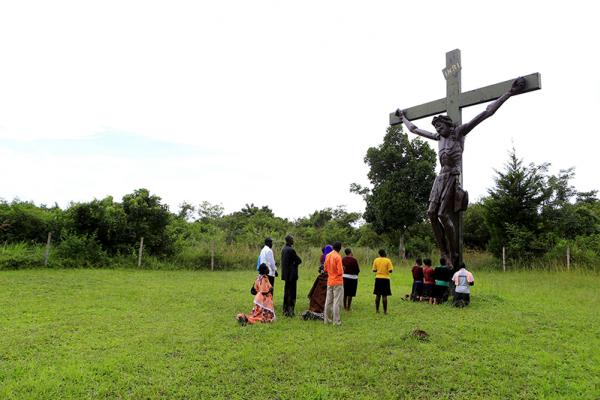As African Catholics usher in the Jubilee Year of Mercy, many bishops and priests here are hoping to use the opportunity posed by Pope Francis to make inroads toward a more meaningful interfaith understanding with Muslims.
Francis marked the start of the jubilee on Dec. 8, when he opened the Holy Door at St. Peter’s Basilica in Rome. The yearlong celebration calls on Catholics to reflect on the theme of mercy and forgiveness and showcase a more inviting faith.
That theme resonates in Africa, home to about 200 million Catholics. A sizable part of this population is tormented by war, violence from Muslim extremists, HIV/AIDS, and poverty.
The pontiff set the tone on his first African tour last month, when during a visit to war-torn Central Africa Republic, Francis urged the pro-Christian anti-Balaka and Muslim Seleka to work for peace.
“Together, we must say no to hatred, to revenge, and to violence, particularly that violence which is perpetrated in the name of a religion or of God himself. God is peace, ‘salaam,’” the pope said, using the Arabic word for peace.
The Jubilee Year coincides with the African Year of Reconciliation. The year, declared by the Symposium of Episcopal Conferences of Africa and Madagascar, an Africa-wide Catholic group, began July 29, 2015. Through SECAM, the bishops have said they will focus on compassion toward people living with HIV/AIDS during the Holy Year of Mercy.
Bishop Giorgio Bertin of Djibouti, a country that borders Eritrea, Ethiopia, and Somalia, stressed that mercy is central to the many people living under difficult situations on the continent.
“I think we should stress the aspect of reconciliation with God and among all the peoples living in Africa as well as reconciliation from an ethnic, social, interreligious, and individual point of view,” he said.
Somalia, in particular, has been struggling with Muslim extremists since 1991, when a civil war broke out. It is the base of the al-Shabab terrorist group.
“The main issues we will be talking about in Somalia and Djibouti are: respect for our differences, forgiveness as a step towards reconciliation, greater love and justice for the poor,” Bertin said.
“We also have to respond to the needs, as people’s shepherds.”
The Rev. Chrisantus Ndaga, deputy general secretary of the Association of Member Episcopal Conferences in Eastern Africa, said Christians must forgive Muslims who attacked churches or public places.
The failure to forgive is the real cause of most of the problems Africa is experiencing, Ndaga said.
“Bishops and priests will be seeking to make forgiveness real in people’s hearts,” he added.
“They will be asking the people not to (take) revenge since these acts are behind most problems in the world,” he said.
In Libya, Catholics have embraced the Jubilee Year observance, despite the pressure on Christians exerted by the so-called Islamic State, which expanded here in 2014 and has released videos showing the beheadings of Christians.
With the threats posed by Muslim militias, Christians have been fleeing the country.
The Rev. Don Bosco Ochieng Onyalla, a priest of South Sudan and a lecturer at Tangaza University College in Nairobi, said a significant symbol of the Jubilee Year is the move by the pope to allow priests to forgive the sin of abortion.
“This is a significant lesson about our merciful God, that God will not deny anyone forgiveness who sincerely repents and seeks reconciliation with him,” he said.
In addition, South African Bishop Jan de Groef urged Catholics to take advantage of the jubilee to reach out to those who have fallen away.
“I very much encourage you to celebrate … as a joyful encounter … full of mercy and compassion, throughout the year,” De Groef said in a statement.
Got something to say about what you're reading? We value your feedback!
